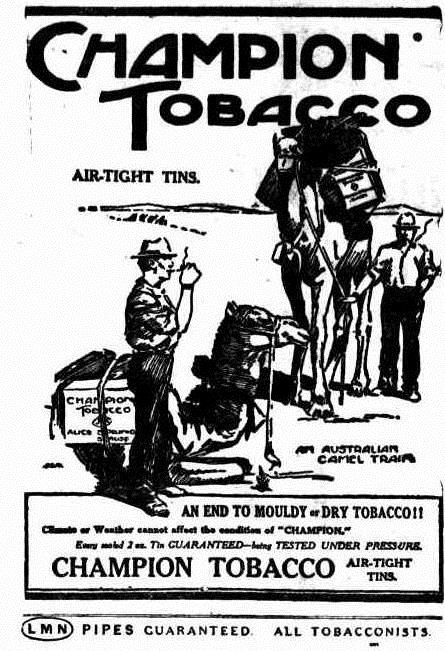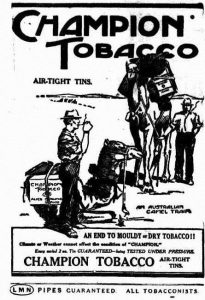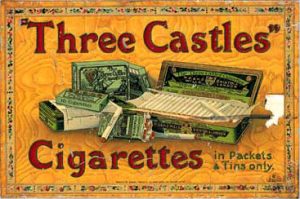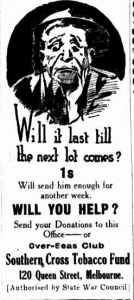Tobacco is not so much a luxury as an actual necessity to our men at the front – Lieut-Colonel Henry Paul Treeby, Commandant of the East Surrey Depot, 1916
You ask me what we need to win this war. I answer tobacco, as much as bullets – General John Joseph “Black Jack” Pershing, Commander-in-Chief of the American Expeditionary Force, 1917
Cigarettes and tobacco were an integral part of army life during the First World War. Just two months into the war the British trade journal Tobacco claimed:
it might almost be said that a man in the firing line first thinks of his cartridges and the very next thing he seems to worry about is ammunition for his pipe. The pipe itself is only less precious than the rifle.
Those soldiers who smoked were often described as “devotees at the shrine of Our Lady Nicotine”, or in the case of Orange railway clerk Jack Earls: “a solid worshipper at the shrine of My Lady Nicotine”.
Soldiers departing for overseas service were generally given a farewell gift which invariably included cigarettes. When 24 local lads left Orange for embarkation in Sydney in September 1915 they were each presented with a large packet of Three Castles cigarettes and a pocket testament.
Cigarettes and/or tobacco were often issued as part of a soldier’s rations. Charitable organisations such as the YMCA and Red Cross Society ensured that troops received a steady supply of cigarettes and tobacco. In January 1917 James Anderson Murdoch, a volunteer with the Australian branch of the British Red Cross Society affirmed that the Red Cross distributed 250,000 cigarettes a week to Australian troops, and the demand was visibly increasing. “Cigarettes”, he claimed, were “the most acceptable portion of the Red Cross distribution”, followed by Australian newspapers.
In December 1916 Velda Fletcher of Anson Street was the grateful recipient of a Christmas package from the NSW Comforts Fund. He wrote from France to say that he had spent a most pleasant Christmas:
We had roast beef and potatoes, plum pudding, also preserved fruits for our dinner… We had a packet each from the Comforts Fund of NSW, which contained pipe, cigarettes, lollies, matches, chewing gum, handkerchief, writing paper and matchbox holder.
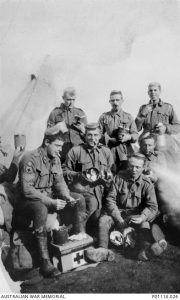
Members of the 4th Australian Field Ambulance display their Christmas billies, 1916. The billies contained foodstuffs and a pipe. Some of the men are wearing the billy lid on their head. Image courtesy Australian War Memorial.
Countless fundraisers were held on the home front to supply comforts for those fighting overseas. Cigarettes and tobacco were a fundamental component of care packages. In September 1915 the Leader claimed that fifty percent of soldiers’ letters from the front complained about the shortage of cigarettes and tobacco. The newspaper suggested that the young ladies of Orange host a pipe and tobacco evening “where all who felt so inclined would bring along their quota of the narcotic need in any manufactured form”
Later that month a Pipe and Tobacco Dance was held at the Oddfellow’s Hall; attendees were advised to supply at least four packets of cigarettes. Despite being “not as largely attended as was anticipated”, the event raised 2,010 cigarettes, 12 medium tins of tobacco, one large tin of Vice Regal tobacco, and one pound of tobacco.
The following month Mrs Elder of Anson Street hosted a fundraiser and collected 58 tins of tobacco, eight packets of cigarettes and 46 cakes of soap for the district’s soldiers.
Children were also encouraged to help supply cigarettes for soldiers. In June 1917 schoolchildren from Lewis Ponds sent a comfort package containing predominantly cigarettes and tobacco.
Wartime advertising campaigns linked smoking with patriotism. In 1917 the Southern Cross Tobacco Fund advised:
It is the duty of every man and woman at home to see to it that there is a plentiful supply [of cigarettes for soldiers]. For just one shilling the Fund (authorised by the State War Council) will keep a soldier in tobacco for one week.
Soldiers smoked for many reasons. Smoking helped to relieve boredom and pass the time during the long stretches of relative quiet and waiting at the front. The smell of smoke undoubtedly masked the stench of death and the squalor of the trenches. Smoking provided a chance to momentarily escape, to take time out from the daily horrors of the battlefront. It created a sense of camaraderie, boosted morale and helped to relieve stress. During the Christmas truce of 1914 German and British soldiers left their trenches to fraternise and share a smoke with the enemy.
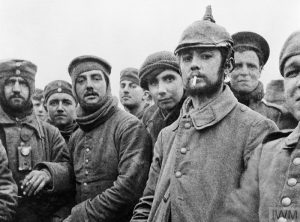
British and German soldiers fraternising at Ploegsteert, Belgium, on Christmas Day 1914. Image courtesy Imperial War Museum © IWM (Q 11745).
Tobacco was a distinct necessity for wounded and recovering soldiers. Lieutenant William Britt, injured in the first day’s fighting at Gallipoli wrote from hospital in Alexandria:
Luckily I have got some tobacco and the orderly got me a pipe… A little present of Havelock tobacco would be very acceptabel. [sic]
In June 1915 George Tidex wrote from hospital in Heliopolis:
Had two lady visitors last Sunday, giving out cigarettes and chocolate
And in April 1917 Edward Irwin of Hill Street observed from hospital in England:
The nurses are very good to you. They fetch cigarettes and matches to you.
Indeed, cigarettes were even credited with saving a soldier’s life. In August 1915 Norman Douglas Sherwin of Cargo described how a packet of cigarettes saved him from serious injury or death:
I had a very narrow escape, it was a packet of cigarettes that saved me, if not from being killed at least from serious injury. I was opening a packet of cigarettes at the time (holding my hands in front of my body as I did so) when the bullet went through my hand, through the cigarettes, through five thicknesses of my tunic, made a hole in my shirt and hit me in the stomach, taking some skin off and making a large bruise, and also winded me.
Norman sent the cigarette packet home as a souvenir for his mother. He later asked:
[Unfortunately Norman’s “good luck” later ran out; he died in Palestine in March 1918 whilst a prisoner of war.]Did you get the cigarette packet I sent you, with the shrapnel wound in it? There is a bit of my blood on it, which I want again when I return.
According to a recent World Health Organization (WHO) study more people died during WWI as a result of smoking than were killed in action or died of wounds.
Smoke Wreaths in Egypt by Sir Peter McBride
I’ve wandered afar from Old England,
With pleasures of London I’m done;
I’m at drill where the sand around Cairo
Gleams white to the kiss of the sun.
The canteen’s quite close and I’m thirsty,
But I am financially broke,
So I light up the pipe that you gave me,
And my troubles soon vanish in smoke.The Major has given us ”Smoke oh!”
I rest with my pack by my side;
And in fancy I see in the smoke rings—
“Best wishes from Catherine McBride.”
My mates by my side are forgotten,
All fear of the Major has fled,
For I seem to be roaming in Egypt
Ere the Queen of all Egypt was deadI go for a stroll by the river,
Cleopatra salutes with a smile;
The Harem all spring to attention,
Then form a platoon by the Nile.
But Anthony sees me and curses.
And fondles his gun rather queer,
So I beat a retreat for the Wazza,
And promptly I call for a beer.The girls at the Wazza are dancing,
I halt them and make them form fours;
Then I call out a sergeant to drill them,
And sentries I place at the doors.
The landlord posts arms for inspection—
His missus is serving the beer,
We fall in two deep at the counter,
When somebody shouts in my ear.“We are moving, you fool, get a move on!”
I awake and struggle to rise.
The girls on the Wazza have vanished,
I’m wiping the dream from my eyes;
The Major’s ferociously cursing,
And swears by the Prophets that he
Has a hot time in store for a loafer,
And the loafer, alas! it is me.Now my harness is on and I’m ready,
“Right turn,” and we’re marching away;
I’d mortgage my chances in Heaven
To be in Australia to-day;
And the Major can go to the devil,
I think as behind him we stride,
For the pipe that I have in my pocket
Carries wishes from Catherine McBride.
Further reading:
Cigarettes or war: which is the biggest killer?

